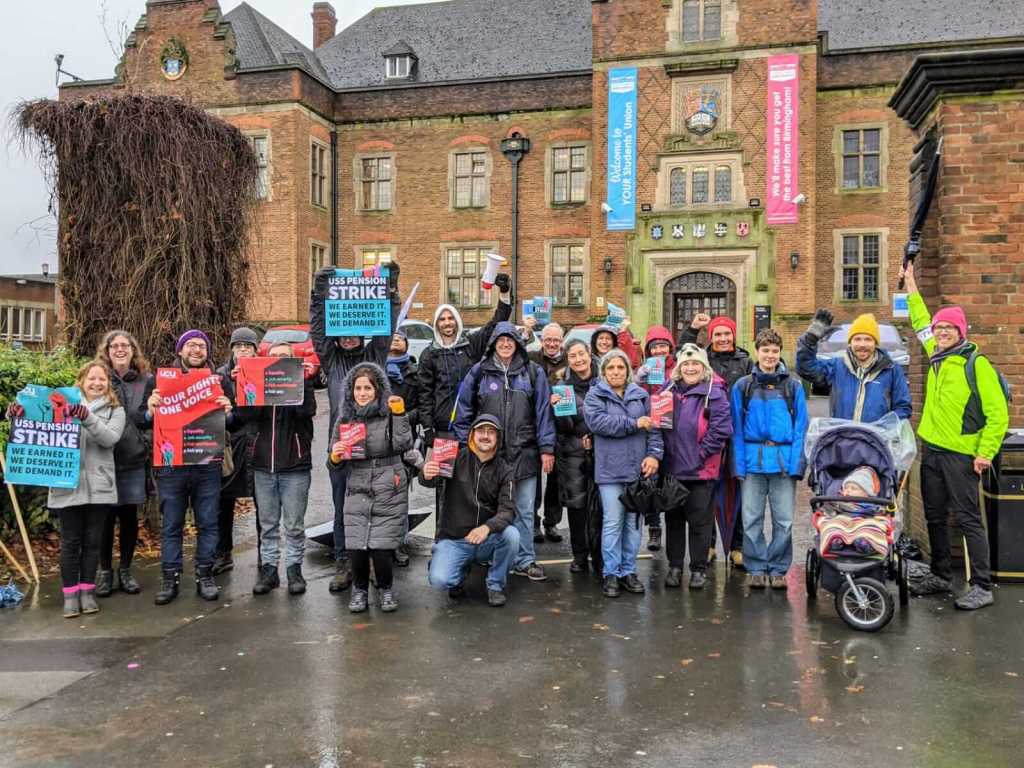The following open letter has been signed by a number of eminent professors of law around the United Kingdom, in support of the human rights and trade union rights of our members and colleagues at the University of Birmingham. You can add your name to the letter via our Change.org petition.
We urge the university management to take account of the legal analysis presented here, and to withdraw the threats made against striking staff. A civic university must be a public space, free for protest and lawful industrial action. Let’s work together for a truly inclusive, fair and equal University of Birmingham.
Open letter to Professor Tim Jones
Dear Professor Jones,
In your UoB Briefing email of 22 November 2019, you claimed that the University is ‘private land’ and that picketing on the university campus would constitute trespass. We are writing in response to that claim, as members of the academic legal community with a deep concern for the rights of our colleagues and students at institutions across the United Kingdom.
The University of Birmingham is a public authority as understood under s. 6 of the Human Rights Act 1998. As such, it has an obligation to act in a manner compliant with the human rights protected by the European Convention on Human Rights (ECHR). As a public authority under s. 6, the University’s rights as a landowner are conditioned by and subordinate to its legal obligations under the Human Rights Act 1998 (City of London v Samede & Ors [2012] EWCA Civ 160). Furthermore, and as suggested by the University’s community-oriented characterisation of the Green Heart, for example, and the funding model for the University which includes receipt of significant public monies, the University campus is best understood as privately owned public land.
The rights to protest and to engage in industrial action are protected by Articles 10 and 11 of the ECHR. Peaceful picketing organised by a trade union at or near a place of work is also protected under s. 220 of the Trade Union and Labour Relations Consolidation Act 1992. It is established case law that protesters have a right to choose the time, place and manner of their assembly in order to ensure that their message can have the greatest impact (Lashmankin v. Russia, Apps. No. 57818/09 and 14 Ors, Grand Chamber ECtHR 7 February 2017).
While Article 10 and 11 rights may be limited, any limitations will be lawful only inasmuch as they are proportionate. As such, justification for their limitation must be provided in order for their proportionality to be assessed. The mere assertion of the campus as ‘private land’ does not constitute such appropriate justification and fails the well-established test of proportionality, as articulated by Lord Sumption, for example, in Bank Mellat (No 2) [2013] UKSC 39.
Accordingly, in English law, Article 10 and 11 rights may be restricted but only “in ways which are in accordance with the law, necessary in a democratic society, and proportionate, for the prevention of disorder or crime, or the protection of the rights or freedoms of others” (Thames Cleaning & Support Services Limited v United Voices of the World [2016] EWHC 1310, per Warby J). Bans on holding protests in the vicinity of specific buildings are disproportionate if they are “not specifically circumscribed to address a precise risk to public safety or a precise risk of disorder with the minimum impairment on the right of assembly” (Lashmankin v Russia, § 437).
Picket lines and rallies at the University of Birmingham, as our colleagues there have confirmed to us, have been good natured, passionate, respectful and extremely well attended. This includes attendance by students and members of the public who support the action and who stop to engage with our Birmingham colleagues as they teach, explain, and engage on the picket lines.
We cannot see how a total prohibition on picketing and rallies on campus is a proportionate limitation of ECHR rights or compliant with the University’s legal obligations under the Human Rights Act 1998. Nor is it, we argue, in keeping with any university community’s collective commitment to education and engagement, or with the deeply rooted civic mission of the University of Birmingham.
In solidarity with our colleagues at the University of Birmingham, we therefore urge you to revisit this decision, to provide appropriate and legally-adequate evidence-based justification for the approach taken, and to engage with the local branch of UCU in anticipation of on-campus activities.
David Mead, Professor of UK Human Rights Law, University of East Anglia
Michael Hamilton, Associate Professor of Public Protest Law, University of East Anglia
Daithí Mac Síthigh, Professor of Law and Innovation, Queen’s University Belfast
Colm O’Cinneide, Professor of Human Rights Law, University College, London
Merris Amos, Professor of Human Rights Law, Queen Mary, University of London
Lindsay Stirton, Professor of Public Law, University of Sussex (external examiner, Birmingham Law School)
Michael Gordon, Professor of Constitutional Law, University of Liverpool
Aileen McHarg, Professor of Public Law and Human Rights, University of Durham
Helen Fenwick, Professor of Law, University of Durham
Jeff King, Professor of Law, University College, London
Alan Bogg, Professor of Labour Law, University of Bristol
Conor Gearty, Professor of Human Rights Law, London School of Economics
Gavin Phillipson, Professor of Public Law and Human Rights, University of Bristol


Leave a comment